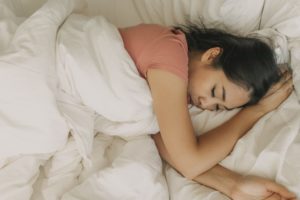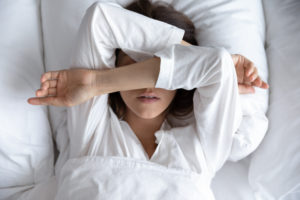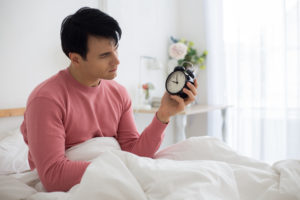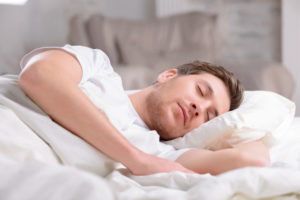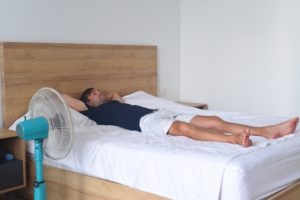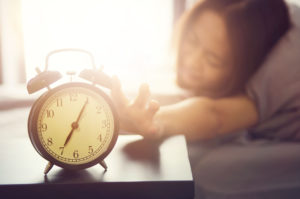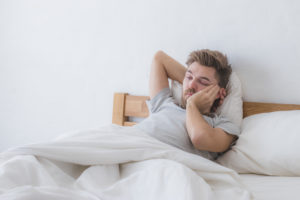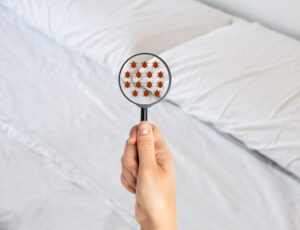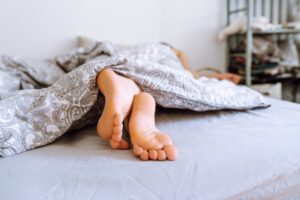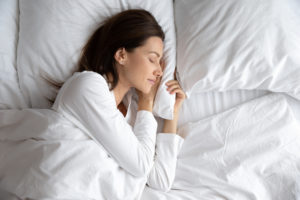When you buy through our links, we may earn a commission. Products or services may be offered by an affiliated entity. Learn more.
How to Wake Up Easier
Some people open their eyes after a restful night’s sleep ready to start their day. However, many individuals struggle to feel alert in the morning and, as a result, find it challenging to prepare for work, school, or other responsibilities.
The initial grogginess experienced after waking up, also called sleep inertia, is one reason why mornings can be challenging. However, small lifestyle changes can improve morning alertness and minimize the undesirable effects of sleep inertia. We discuss a number of strategies to help you wake up easier in the morning and stay alert.
Looking to improve your sleep? Try upgrading your mattress.
Keep Consistent Wake Up and Bed Times
Sleep experts recommend going to sleep and waking up at the same time each day, even on weekends. A consistent sleep schedule helps regulate the body’s internal clock, which influences the sleep-wake cycle, a set of physical processes that cause one to feel sleepy at night and awake in the morning.
The sleep-wake cycle affects a number of important functions, from restoring energy to healing the body . If a person’s sleep schedule is irregular or not aligned with sunrise and sunset, waking up in the morning may feel more challenging.
Avoid the Snooze Button
Getting out of bed after the first alarm can make waking up easier. Although it may be tempting to hit the snooze button to get an extra few minutes of sleep, any additional sleep will be fragmented. Disrupted sleep does not provide the same benefits as continuous sleep. In fact, it is associated with increased stress and other harmful effects.
Rather than allotting yourself time to snooze in the morning, it may be more helpful to set your alarm a little later and avoid snoozing in order to maximize sleep quantity and quality. If it is challenging for you to rise after hearing the first alarm, move the alarm device farther from your bed to encourage wakefulness.
Get Enough Sleep
One reason people rely on the snooze button is because they do not wake up feeling refreshed and crave more sleep. However, sleeping a few extra minutes in the morning is not an efficient way to deal with chronic sleep deprivation.
Each person has their own individual sleep needs, but most adults require at least seven hours of sleep. Despite this, more than 35% of people sleep less than seven hours each night. Consider your bedtime, wake time, and overall time spent sleeping during the night. If you struggle to wake up in the morning, you may benefit from setting aside more time for sleep.
Let in Natural Light
Exposure to daylight stops the production of melatonin, a hormone that helps regulate the sleep-wake cycle by promoting sleep. Sleeping with the curtains open or partially open may allow the sun to wake you naturally. If you reside in a location with less daylight or follow a schedule that requires waking up in darkness, consider using a wake-up light. These lights are designed to turn on gradually and behave like natural sunlight.
Additionally, exposure to light during the daytime can support a healthy sleep-wake cycle. A study of university students found that blue light in the classroom promotes alertness and improved moods during morning classes. Another study of office employees who were exposed to light during the workday showed participants experienced better moods and higher quality sleep at night .
[ocm-sleep-as-a-service-display]
Listen to Energizing Music
Research shows that the sound of your alarm could potentially reduce the grogginess or sleep inertia you experience after waking. While data is inconclusive, there is some evidence which associates melodic-sounding alarms with less perceived sleep inertia and neutral-sounding alarms, like beeping, with greater perceived sleep inertia.
Melodic music follows predictable patterns, which makes them easy to hum or sing along to and might be more stimulating to wake up with. Experiment with different alarm sounds or songs to identify the best way to transition yourself from sleep to wakefulness.
Take a Shower
For many people, taking a shower is an integral part of their morning routine. Water temperature in particular may influence alertness.A randomized controlled study examined the impact of taking hot-to-cold showers in the morning. Participants started with a shower at their preferred temperature and then spent the last 30 to 90 seconds of the shower under the cold water. A frequently cited benefit of the cold water exposure was higher levels of energy. Some participants described the energy boost as being similar to the effect of consuming caffeine.
Eat a Nutritious Breakfast
Food is essential for getting necessary nutrients and energy each day. Eating breakfast is a great way to increase your energy in the morning.
People who regularly eat breakfast report greater alertness and improved mood when waking up as well as better overall sleep than people who do not eat breakfast. Additionally, the practice of skipping breakfast may disrupt one’s sleep-wake cycle.
Current dietary guidelines indicate that a healthy diet includes protein, fruits or vegetables, whole grains, and low-fat milk products, so it can be beneficial to incorporate these food groups into your breakfast.
Exercise Regularly
Frequent exercise has many health benefits, including better quality sleep. Studies have found that regular exercise can help people fall asleep quicker and sleep longer, which may help them wake up feeling more refreshed.
Sleep experts recommend exercising most days for at least 30 minutes . However, they also advise against heavy exercise two to three hours before going to sleep. Intense exercise before bedtime can increase the time it takes to fall asleep. Gentle exercise, such as stretching or yoga, may be appropriate as part of a relaxing routine before bedtime.
Practice Good Sleep Hygiene
A good night’s sleep makes waking up easier. Sleep hygiene refers to the healthy habits that can support quality sleep. There are many lifestyle practices that promote good sleep hygiene.
- Follow a nightly routine: A relaxing routine in the evening can help you wind down. Reading a book, taking a bath, listening to music, practicing yoga, and meditating are all strategies that promote a calm mindset before bedtime.
- Cultivate healthy habits: Daytime activities can also impact sleep at night. Regular exercise and daily sunlight exposure are important to both your overall health and sleep quality.
- Optimize your bedroom: A sleep environment should be dark and quiet with a cool temperature. To prime your bedroom for sleep, you can use a fan for white noise and hang up blackout curtains to block unwanted light.
- Limit screen time: Screens such as smartphones, tablets, and computers emit blue light that can disrupt your sleep-wake cycle and affect sleep quality. Experts recommend removing these devices from the bedroom for better sleep.
- Avoid certain beverages and foods: Drinking caffeine too late in the day may keep you awake at night, and alcohol worsens sleep depth and duration. Avoid eating spicy and fatty foods before bedtime as they may trigger heartburn and make it difficult to fall asleep.
- Get out of bed if you cannot sleep: Limit your bed use to sleep and sex. If you cannot fall asleep within 20 minutes after getting into bed, try a quiet, relaxing activity in another room. Return to bed when you feel sleepy.
When to Talk to Your Doctor
Sometimes improving alertness in the morning is not as simple as making lifestyle adjustments. Regularly waking up feeling groggy and unrefreshed may be a sign of an underlying sleep disorder. Other symptoms of sleep disorders include:
- Difficulty falling asleep or staying asleep
- Excessive snoring or lapses in breath during sleep
- Daytime sleepiness and a need for frequent naps
- Tingling or crawling sensations in the limbs
- Frequent jerking or twitching during sleep
Take note of your experiences sleeping, waking up, and your daytime energy levels and share them with your health care provider. A doctor can determine if you may have a sleep disorder and offer treatment recommendations or referrals for further evaluation.

Still have questions? Ask our community!
Join our Sleep Care Community — a trusted hub of sleep health professionals, product specialists, and people just like you. Whether you need expert sleep advice for your insomnia or you’re searching for the perfect mattress, we’ve got you covered. Get personalized guidance from the experts who know sleep best.
References
9 Sources
-
Reddy, S., Reddy, V., Sharma, S. (2021, May 9). Physiology, circadian rhythm. In StatPearls. StatPearls Publishing., Retrieved March 6, 2023, from
https://www.ncbi.nlm.nih.gov/books/NBK519507/ -
Medic, G., Wille, M., & Hemels, M. E. (2017). Short- and long-term health consequences of sleep disruption. Nature and Science of Sleep, 9, 151–161.
https://pubmed.ncbi.nlm.nih.gov/28579842/ -
Consensus Conference Panel, Watson, N. F., Badr, M. S., Belenky, G., Bliwise, D. L., Buxton, O. M., Buysse, D., Dinges, D. F., Gangwisch, J., Grandner, M. A., Kushida, C., Malhotra, R. K., Martin, J. L., Patel, S. R., Quan, S. F., Tasali, E., Non-Participating Observers, Twery, M., Croft, J. B., Maher, E., … Heald, J. L. (2015). Recommended amount of sleep for a healthy adult: A joint consensus statement of the American Academy of Sleep Medicine and Sleep Research Society. Journal of Clinical Sleep Medicine, 11(6), 591–592.
https://pubmed.ncbi.nlm.nih.gov/25979105/ -
National Center for Chronic Disease Prevention and Health Promotion, Division of Population Health. (2017, May 2). Short sleep duration among US adults. Centers for Disease Control and Prevention., Retrieved March 6, 2023, from
https://www.cdc.gov/sleep/data-research/facts-stats/index.html -
Choi, K., Shin, C., Kim, T., Chung, H. J., & Suk, H. J. (2019). Awakening effects of blue-enriched morning light exposure on university students’ physiological and subjective responses. Scientific Reports, 9(1), 345.
https://pubmed.ncbi.nlm.nih.gov/30674951/ -
Figueiro, M. G., Steverson, B., Heerwagen, J., Kampschroer, K., Hunter, C. M., Gonzales, K., Plitnick, B., & Rea, M. S. (2017). The impact of daytime light exposures on sleep and mood in office workers. Sleep Health, 3(3), 204–215.
https://pubmed.ncbi.nlm.nih.gov/28526259/ -
McFarlane, S. J., Garcia, J. E., Verhagen, D. S., & Dyer, A. G. (2020). Alarm tones, music and their elements: Analysis of reported waking sounds to counteract sleep inertia. PLOS ONE, 15(1), e0215788.
https://pubmed.ncbi.nlm.nih.gov/31990906/ -
Buijze, G. A., Sierevelt, I. N., van der Heijden, B. C. J. M., Dijkgraaf, M. G., & Frings-Dresen, M. H. W. (2016). The effect of cold showering on health and work: A randomized controlled trial. PLOS ONE, 11(9), e0161749.
https://pubmed.ncbi.nlm.nih.gov/27631616/ -
National Heart, Lung, and Blood Institute. (2011, August). Your guide to healthy sleep., Retrieved March 6, 2023, from
https://www.nhlbi.nih.gov/resources/your-guide-healthy-sleep





